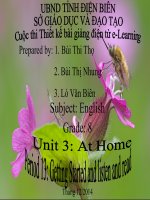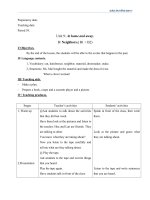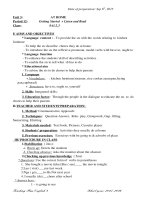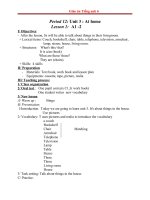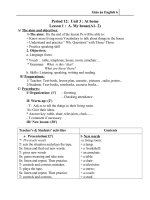Giáo án Tiếng Anh 8 Unit 3: At home
Bạn đang xem bản rút gọn của tài liệu. Xem và tải ngay bản đầy đủ của tài liệu tại đây (143.75 KB, 18 trang )
GIÁO ÁN TIẾNG ANH 8
Unit 3: AT HOME
Lesson 1/12: Getting started + Listen and Read.
A. Aim:
By the end of the lesson, ss will be able to understand the dialogue and use
modal verbs to talk about the housework.
*. Grammar :
S + have / has to + v (bare).
*. Lexical item. Chore, cupboard, steamer, sink, saucepan, frying pan, rice cooker.
*. Teaching aids: pictures, cassette, tape.
*. Skill: listening and reading.
*. Techniques : Work in pair.
B. Contents:
* Warm-up:
Kim's game (Getting started)
- Show 6 pictures in part Getting started to ss.
- Ask them to look at pictures quickly in 30 seconds and try to remember the verbs
in the pictures.
- Have ss play the game in 2 teams.
- Get them to write the answers on the board.
* Answer key:
a. wash dishes/ do the washing up
d. cook
b. make the bed
e. tidy up
c. sweep the floor
f. feed the chicken
I. Presentation:
1. Pre teach vocabulary:
- chore
(n)
:
công việc trong nhà
(example)
- cupboard
(n)
:
tủ li, tủ chạn
(visual)
- steamer
(n)
:
nồi hấp
(situation)
- sink
(n)
:
bồn rửa bát đĩa
- saucepan
(n)
:
cái chảo
(visual)
- frying-pan
(n)
:
chảo rán
(visual)
- rice cooker (n)
:
nồi cơm điện
(visual)
* Checking:
(visual)
R.O.R
2. Pressentation dialogue:
- Have ss listen to the tape player while reading the dialogue between Nam and
Mrs. Vui and then practice in pairs.
- Ask ss to complete the list of the things Nam has to do.
* Nam has to:
• Cook dinner
• Go to the market and buy fish and vegetables
• Call aunt Chi and ask her to meet his mother at Grandma's house.
3. Grammar:
* Model sentences:
- I have to go and visit Grandma after work.
- You have to cook dinner yourself.
* Form: S + have to/ has to + V(bare).
* Meaning: ask ss to translate.
* Use: Dùng để nói ai đó phải làm gì (sự bắt buộc do người ngoài hoặc do hoàn
cảnh bên ngoài, mang tính khach quan).
* Note: "must" dùng để diễn tả sự bắt buộc do người nói ra lệnh (mang tính chủ
quan).
II. Practice: Picture cue drill.
1. do the wasing up
* Example exchange:
2. make the bed
S1: What do you have to do?
3. sweep the floor
S2: I have to do the wasing up.
4. cook dinner
- Ask ss to ask ans answer the question:
5. tidy my room
"What do you have to do?"
6. feed the chicken
III. Further practice: Language Focus 1- p.34
- Ask ss to look at the pictures and complete the dialogue between Nga and Lan,
using "must" or "have to" together with the verbs given.
- Ask ss to work in pairs and compare the answers.
* Answer key:
1. have to/ must tidy.
2. have to/ must dust
3. have to/ must sweep
4. have to/ must clean
5. have to/ must empty
6. have to/ must feed.
- Have ss practice the dialogue in pairs.
IV. Homework:
- Learn by heart vocabulary, form and use.
- Do exercise 1, 2 on page 20 in workbook.
- Make 5 sentences about things that you have to do.
- Prepare for next lesson: Speak.
Unit 3:
AT HOME
Lesson 2/13: Speak
A. Aim:
By the end of the lesson, students will be able to use the prepositions of
place to talk about the positions of furniture in the house.
*. Grammar: Where + be + s ?
S + be +pre of place + N.
*. Lexical item: rug , plate.
*.Teaching aids: a picture, posters.
*. Skill : Speaking.
*. Techniques: practice in pairs.
B. Content:
* Warmer: Brainstorm
in
Near
opposite
beside
Pre of place.
I. Presentation:
1. Vocabulary:
- rug
(n) :
thảm trải sàn
(trans)
- plate
(n) :
cái ®i¨
(visual)
2. Grammar:
- Ask ss to look at the picture on p28 and name items in it.
- Ask ss some questions about the prepositions of each item in the picture.
*Example:
Where is the clock? - It's above the fridge.
Where is the fruit? - in the bowl.
Where is the flowers? - on the table.
Where is the rice cooker? - next to the bowl of fruit.
Where is cupboard? - on the wall, above the counter.
Where is knives? - on the wall, under the cupboard.
Where is dish rack? - on the counter, next to the bowl of fruit.
* Form: Where + be + S?
S + be + pre. Of place + N.
* Use: To ask and answer about the positions of something.
II. Practice:
- Get ss to work in pairs, talking about the positions of items.
* Example:
The calendar is on the wall, above the tsove.
The knives are on the wall, under the cupbpard.
The clock is above the fridge.
The plate is on the table.
……………………….
III. Further practice: Speak 2 (p.29)
- Set the scene: Mrs. Vui bought new furniture for her living room but she can't
decide where to put it. You should help her to arrange the furniture.
- Ask ss to look at the picture and talk about their ideas.
* Note: We can use "should" or "ought to" or "Let's" to make sentences.
Should/ ought to/ Let's + V(bare).
- Ask ss to practice speaking if they agree or disagree.
Agree: OK./ You are right.
Disagree: No, I think we'd better/ should/ ought to …….
I think it should be ……………
* Example exchange:
- Let's put the armcair opposite the couch.
- I think the coffe table should be betwwen the couch and the arm chair.
- Let's put the magazines on the shelf above the books.
- I think the shelf ought to be at the one of the corners, opposite the couch.
- Let's put the telephone and the lamp on the small table next to the couch.
- The TV and stereo should be put on the shelf.
- Let's put the clock on the wall above the picture.
- I think we should hang the picture and the clock above the couch.
………………………..
IV. Homework:
- Learn by heart vocabulary and form.
- Describe your house/ living room/ bedroom.
- Do exercise 2 in workbook.
- Prepare: Listen
Unit 3:
AT HOME
Lesson 3/14: Listen
A. Aim:
By the end of the lesson, students will be able to identifythe right item by
listening and further practice in modal verb: "ought to".
*. Grammar : S + should / ought to + V (bare) + O.
*. Skill : Listening.
*. Techniques: Practice individual and team.
* Teaching aids: a picture, posters, cassette.
B. Content:
* Warmer: Bingo
- Ask ss to write down on their notebooks 5 things they can eat.
- Prepare list of food, then call out each word in a loud voice.
- Ss listen to the teacher carefully. if anyone has the same thing, they cross them
out.
- The first person crossing out all 5 things shouts “Bingo” and wins the game.
I. Listening:
1. Pre - listening: Prediction:
- Get ss to look at p.30 and guess 4 things they use to cook the “Special Chinese
Fried Rice”.
- Run through the things in the picture
? What is this?
- It’s a plate of fried rice... etc.
? Do you know how to make fried rice?
The things use to cook the "Special Chinese Fried Rice"
Numbe
You guess
You listen
r
1
2
3
4
2. While-listening:
- Let ss listen to tape and check ss' predictions.
- Ask ss to compare with their friends
- Give feedback. Check and correct.
* Answer key:
The things use to cook "Special Chinese Fried Rice"
Number
You listen
1
Fried Rice
2
Pan
3
Garlic and green peppers
4
Ham and peas
II. Language Focus 2:
1. Presentation:
- Set the scene: Hoa is very sad because she failed her English test. What do you
say to advise her?
"You should study harder".
Or "You ought to study harder".
* Form: S + should/ ought to + V(bare) + O.
* Meaning: ask ss to translate.
* Use: To give advice to someone.
2. Practice: Language focus 2 (p35).
- Ask ss to do exercise 3 on p35 in textbook: giving advice to people in the
pictures.
* Answer key:
a. I failed my English test.
You ought to study harder.
b. I'm late.
You ought to get up earlier.
c. I'm fat.
You should eat more fruit and vegetables.
d. My tooth aches.
You should see a dentist.
- Get ss to practice in pairs.
3. Further practice: Noughts and Crosses
His tooth/ ache
The floor/ dirty
My English/ bad
(1) Hoa/ late
(2)
(4) Bao/ overweight (5)
(7) Her grades/ bad (8)
My room/ untidy (3)
Mai/ thin
(6)
The TV/ not work (9)
* Example exchange:
(1) S1: His tooth aches.
S2: He ought to go to the dentist's.
(2) S1: Hoa is late.
S2: She ought to get up earlier.
- Have ss play the game.
III. Homework:
- Do agin exercise 2 on p35 in textbook.
- Do exercise 2 in workbook.
- Prepare for next lesson: Read
Unit 3:
AT HOME
Lesson 4/15: Read
A. Aim:
By the end of the lesson, students will be able to understand the safety
precautions in the house and be introduced questions with "why" and answer
with "Because".
*. Grammar : Why + aux. V (not) + S + V ( bare) …….?
Because , S + V …
*Lexical item : Safety , precaution , socket , scissors , match , destroy , injure.
*. Skill: Reading .
*. Techniques : pratice in pairs.
*. Teaching aids: posters.
B. Content:
* Warmer:
Brainstorming:
? Tell me danger in the house for children?
electricity
gas
danger in the house
for children
fire
knife
I. Pre - reading:
1. Pre teach vocabulary:
- safety
(n) :
sự an toàn
(explan)
- precaution
(n) :
sự đề phòng
(traslation)
- socket
(n) :
æ cắm điện
(realia)
- scissors
(n) :
cái kéo
(visual)
- match
(n) :
que diêm
(realia)
phá huỷ
(traslation)
- (to) destroy
:
- (to) injure
:
làm bị thương, chấn thương (picture)
* Checking vocabulary: Slap the board.
2. T/ F statements prediction:
No
1
2
3
Statements
It’s safe to leave medicine around the house
Drug can look like candy
A kitchen is a suitable place to play
Guess Correct
T/ F
4
5
Playing with one match cannot start a fire
Putting a knife into an electrical socket is
6
dangerous.
Young children do not understand that many
household objects are dangerous
- Hang on the poster on board.
- Run through all the statements.
- Ask ss to read the statements and then guess which is true, which is false.
II. While - reading:
1. Checking ss' prediction:
- Let ss to read the text on p.31 and check their prediction.
- Ask ss to correct the false statements.
- Ask ss to compare with their partners.
* Answer key:
2, 5, 6: T
1.F: It’s safe to keep medicine in locked cupboard.
3.F: A kitchen is a dangerous place to play.
4.F: Playing with one match can cause a fire.
2. Comprehension questions:
- Get ss to read the text again and then answer the questions on p. 32.
- Ask ss to work in pairs.
- Call some ss to ask and answer.
* Question:
1. Why mustn’t we let children play in the kichen?
2. Why mustn’t children play with matches?
3. Why must we cover electrical sockets?
4. Why do we have to put all dangerous objects out of children’s reach?
* Answer key:
1. Because the kitchen is a dangerous place.
2. Because playing with one match can cause the fire.
3. Because children mustn’t put anything into electrical sockets and electricity can
kill.
4. Because the dangerous objects can injure or kill children.
III. Post - reading:
1. Grammar:
- Tell ss how to make question with "Why" and answer with "Because".
* Form: Why + aux.v (not) + S + V(bare) …?
Because + Clause.
* Use: To ask and answer about the reasons.
2. Discussion
- Ask ss to work in groups of six discussing one of the topics:
1. Safety precautions in the street.
2. Safety precautions at school.
- Call ss to give their ideas.
IV. Homework:
- Learn by heart vocabulary and the text.
- Do exercise 4 in workbook and 5, 6 in text book (L.F).
Unit 3:
AT HOME
Lesson 5/16: Write
A. Aim:
By the end of the lesson, students will be able to be introduced some
vocabulary related to houses, write a description of a room in their house and
review prepositions of place.
*. Lexical item; Folder , beneath , towel rack , dish rack , lighting fixture ,
wardrobe.
*. Skill. Writing.
*. Techniques : practice in group and in pairs.
*. Teaching aids: picture.
B. Contents:
* Warm-up: Chatting
- Ask ss about the room on page 32.
? Which room is this?
? What is this? Where is this?
I. Pre-writing:
1. Pre teach vocabulary:
- folder
(n)
:
cặp hồ sơ
(visual)
- beneath
(prep) :
phía dưới
(antonym)
- towel rack
(n)
:
giá treo khăn
(picture)
- dish rack
(n)
:
giá đựng bát đĩa
(visuals)
- lighting fixture (n)
:
đèn chùm
(picture)
- wardrobe
:
tủ quần áo
(visual)
(n)
* Checking vocabulary: R.O.R
2. Reading:
- Ask ss to read the description of Hoa's room and look at the picture.
- Ask ss some comprehension questions:
a. What is there on the left of the room?
b. Where is the bookshelf?
c. Where are the folders?
d. What is there on the right of the room?
e. Where is the wardrobe?
* Answer key:
a. There is a desk on the left of the room.
b. The bookshelf is above the desk.
c. The folders are on the desk.
d. There is a window on the right side of the room.
e. The wardrobe is opposite the desk
II. While-writing:
- Ask ss to look at the picture on page 33 and decide where are the things in the
picture.
- Get ss to use the cues and write a description of Hoa's kitchen.
- Ask ss to compare with their partners.
- Get some ss to read aloud their writing.
- Check and correct.
* Answer key:
This is Hoa's kitchen.
There is a refrigerator in the right corner of the room.
Next to the refrigerator is the stove and the oven.
On the other side of the oven, there is a sink and next to the sink is a towel rack.
The dish rack is/ stands on the counter, to/ on the right (side) of the window and
beneath the shelves.
On the counter beneath the window, there are jars of sugar, floor and tea.
In the middle of the kitchen, there is a table and four chairs.
The lighting fixture is above the table, and directly beneath the lighting fixture is a
vase of flowers.
III. Post-writing: Speaking
- Ask ss to talk to their partner about one of the rooms in their house (living room,
kitchen, bathroom, bedroom, …).
- Compare with their partner.
- Ask some ss to role-play.
- Check and correct.
IV. Homework:
- Learn by heart vocabulary.
- Write a description of a room in your house.
- Do exercise 7 on page 26 in workbook.
- Prepare: Language Focus.
Unit 3:
AT HOME
Lesson 6/17: Language Focus
A. Aim:
By the end of the lesson, students will be able to be introduced reflexive
pronouns and review modal verbs: must, have to.
*. Grammar : ought to +V (bare) ,
*. Skill. Speaking and writing.
*. Techniques : Practice in pair and group.
B. Contents:
* Warm-up:
Brainstorm
Clean the floor
fix the TV
cook
Things
you can do
Things
you can't
do
tidy up
I. Presentation:
1. Activity 1: Reflexive pronounns.
* Set the scene: "What do you say when you do your homework and noone helps
you?"
- Model sentences: I do my homework myself.
- Explain the reflexive pronouns:
* Form:
The first
The second
The third
Singular
Pronoun
Ref. Pro
I
myself
You
yourself
He
himself
She
herself
It
itself
Plural
Pro
We
You
They
Ref. Pro
ourselves
yourselves
themselves
* Use:
Đại từ phản thân dùng để nhấn mạnh chính chủ ngữ thực hiện hành động.
* Note: by + ref. pro: tự làm/ một mình.
Eg: They often cook dinner by themselves.
I like living by myself.
- Emphasis pronouns: use to emphasize a person or a thing
Ex: Lan is looking at herself in the mirror.
2. Activity 2: ought to
- Give ss a situation: Lan is thirsty. What do you say to advise her?
- Model sentence: She should drink an orrange juice.
- Ask ss give another word for “should”? - ought to
* Form: ought to + V(bare).
II. Practice:
1. Exercise 2 (p.35)
- Ask ss to look at the pictures on p.35 and give advice to people. Using “ought to”
- Model: You ought to study harder.
- Get ss to practice
2. Word cue drill:
a. You/ do/ homework
b. He/ fix/ washing machine
c. Lan/ cook/ dinner
d. Nam and Minh/ paint/ the picture.
e. You/ do/ your chores.
* Example exchange:
a. S1: Did you do your homework?
S2: Yes. I did it myself.
3. Gap filling: Fill in the blank with a suitable ref. pro.
a. We planted these trees … .
b. They are learning how to cook Fried Rice by … .
c. He and I … always help her in difficulties.
d. The cat … is eating the mouse.
III. Further practice:
1. Exercise 3 (p.36)
- Ask ss to complete the dialoguages on p.36 using reflexive pronouns
- Give feedback. Check and correct.
1. ourselves
4. himself
7. yourselves
2. myself
5. herself
6. themselves
3. yourself
2. Exercise 4 (p.36, 37).
- Let ss to look at the pictures and make sentence with each picture using: Why Because.
* Keys: b. Why did Nam have to cook dinner?
Because his mother was home late.
c. Why was Mrs.Vui home late?
Because she had to come to see grandmother.
d. Why did Ha fail her English exam?
Because she didn’t learn for her exam. She played the computer games.
e. Why didn’t Nga go to the movies?
Because had todo her chores. She had to clean the kitchen and sweep the living
room.
IV. Homework:
- Learn by heart form and use of ref. pro.
- Do all execises in Language Focus and workbook.

